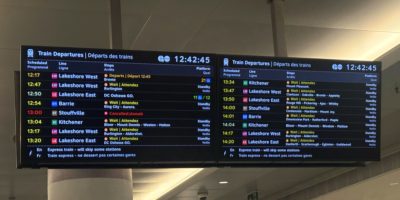By Lori Fazari
An eclectic crew of people regularly find themselves lost and confused outside our doorway, seeking the studios of Ryerson’s radio station, CKLN 88.1 FM. Patiently we direct them to the narrow hallway behind us, where the flow of traffic is nil and the offices are even smaller and more cramped than ours.
It’s CKLN’s lot to be overlooked as part of the Ryerson community, partly through their lack of promotion but also because they sit low on students’ radar. We’re too busy listening to the mainstream airwaves to seek out different, and people have trouble even finding their studios, positioned as they are deep in the bowels of Jorgenson Hall.
The fact that the station is in a financial bind makes it no different than many other campus community stations. Half its funding comes from student fees, the rest from advertising, fundraising and government grants (a source which has dried up over the past few years).
Until Sunday, CKLN is asking listeners to open their wallets during the annual funfest drive, which aims to collect $125,000.
The station may sit low on people’s priority, but debate is lively when it comes to its money matters.
For years CKLN has tried to launch a referendum to ask student for an increase in the fees they pay to the station, which have rested at $8.03 since 1982.
Ryerson’s student council rejected CKLN’s bid for a referendum until the station worked to become more campus-involved and get better control of its finances.
Because it found itself in a similar financial predicament last year, the radio station at the University of Toronto took a leap that would make any campus station manager cringe — selling off six hours of their airtime a night. When you dial into CIUT at 89.5 FM from midnight to 6 a.m., you’ll hear pumped in rave music from a company called Virtually Canadian.
The whole point of a campus-run, community station is to be in touch with that community station is to be in touch with that community, not to put out the same stuff you can find anywhere else on the radio dial.
When you’re struggling to manage with your resources squeezed to the max, the everyday operations become the ultimate struggle. Day or night, when you pass by CKLN’s offices or basement studios, you’ll find the place humming with the activity of some 150 volunteers who work there each year. There’s less bureaucracy, but a function of being small also means less planning and, ultimately, less foresight.
Every day we shake our heads and direct the artists and activists at our door toward CKLN for their chance at the mike. It’s a voice that deserves to continue being heard at Ryerson, one that has put us on the map as having the best campus radio station in Canada.
Financial turmoil might suffocate them, but if their plea for funding goes unheard, the next step may be to sell out, go mainstream and play what all the other stations are playing.











Leave a Reply